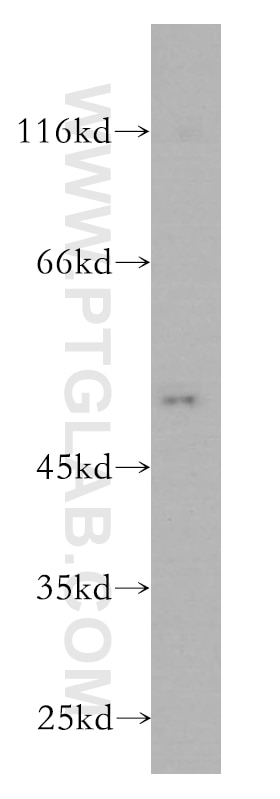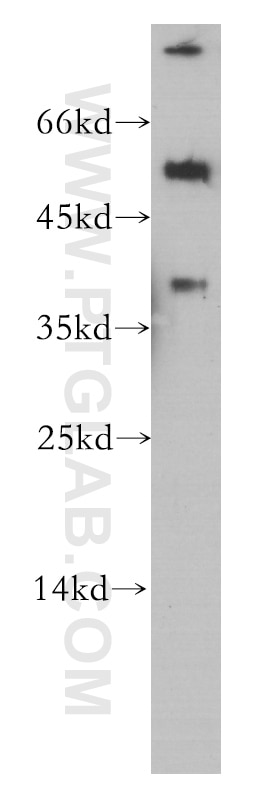Inhibin Beta A Monoklonaler Antikörper
Inhibin Beta A Monoklonal Antikörper für WB, ELISA
Wirt / Isotyp
Maus / IgG1
Getestete Reaktivität
human
Anwendung
WB, ELISA
Konjugation
Unkonjugiert
CloneNo.
1E3C6
Kat-Nr. : 60015-1-Ig
Synonyme
Geprüfte Anwendungen
| Erfolgreiche Detektion in WB | humanes Hirngewebe |
Empfohlene Verdünnung
| Anwendung | Verdünnung |
|---|---|
| Western Blot (WB) | WB : 1:200-1:1000 |
| It is recommended that this reagent should be titrated in each testing system to obtain optimal results. | |
| Sample-dependent, check data in validation data gallery | |
Veröffentlichte Anwendungen
| WB | See 2 publications below |
Produktinformation
60015-1-Ig bindet in WB, ELISA Inhibin Beta A und zeigt Reaktivität mit human
| Getestete Reaktivität | human |
| In Publikationen genannte Reaktivität | human |
| Wirt / Isotyp | Maus / IgG1 |
| Klonalität | Monoklonal |
| Typ | Antikörper |
| Immunogen | Inhibin Beta A fusion protein Ag1001 |
| Vollständiger Name | inhibin, beta A |
| Berechnetes Molekulargewicht | 47 kDa |
| GenBank-Zugangsnummer | BC007858 |
| Gene symbol | Inhibin beta A |
| Gene ID (NCBI) | 3624 |
| Konjugation | Unkonjugiert |
| Form | Liquid |
| Reinigungsmethode | Caprylsäure- Ammoniumsulfat-Präzipitation |
| Lagerungspuffer | PBS with 0.02% sodium azide and 50% glycerol |
| Lagerungsbedingungen | Bei -20°C lagern. Nach dem Versand ein Jahr lang stabil Aliquotieren ist bei -20oC Lagerung nicht notwendig. 20ul Größen enthalten 0,1% BSA. |
Hintergrundinformationen
Inhibin βA(INHBA) is a ligand in the transforming growth factor β (TGF-β) superfamily. Inhibin βA forms a disulfide-linked homo-dimer known as activin A, which has been implicated in multiple biologic processes, including neoplastic progression. The inhibin βA can also bind the βB and α isoforms to form activin AB and inhibin, respectively.
Protokolle
| PRODUKTSPEZIFISCHE PROTOKOLLE | |
|---|---|
| WB protocol for Inhibin Beta A antibody 60015-1-Ig | Protokoll herunterladen |
| STANDARD-PROTOKOLLE | |
|---|---|
| Klicken Sie hier, um unsere Standardprotokolle anzuzeigen |
Publikationen
| Species | Application | Title |
|---|---|---|
J Proteome Res Mining the gastric cancer secretome: identification of GRN as a potential diagnostic marker for early gastric cancer. | ||
Oncotarget Overexpression of colorectal cancer oncogene CHRDL2 predicts a poor prognosis. |



